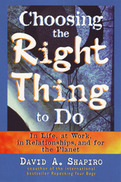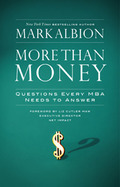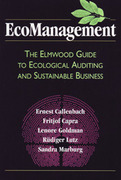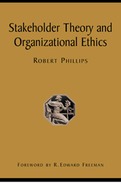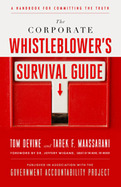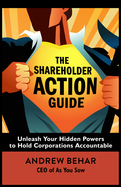- Presents a process by which readers can make moral choices that more accurately reflect their deepest values and commitments
- Offers more than 20 questions to ask, principles to explore, and tips to follow to choose the right thing to do in any situation
- By the co-author of Repacking Your Bags: Lighten Your Load for the Rest of Your Life, which has sold more than 200,000 copies worldwide
2008
That's a question every MBA faces. A lot of time and money has been invested in you. Once you graduate, you're supposed to cash in that ticket for as much money and status as you can. Your parents and peers expect it, and with thousands of dollars of student loans, you may feel that there's really no other choice. You can't risk "wasting" that expensive education. It's the safe thing to do. Isn't it?
Not necessarily. In fact, when you measure success by more than money, what you think is your safest choice may actually be the riskiest. The “safe” choice can lead to enormous psychological and spiritual pain, costing you a chance to live your life. As Ralph Waldo Emerson observed, “Sometimes money costs too much.”
Mark Albion doesn't pretend to have all the answers, but his unique perspective can help you find yours. He guides you through a framework of four crucial questions and twelve principles to consider when making career decisions. Using tales of experience to caution and uplift, Albion helps you construct your personal, strategic "destiny plan."
An inspirational yet practical career guide, More Than Money encourages aspiring MBAs, current students, and graduates to give themselves permission to be who they really want to be and to find their path of service and fulfillment. As Albion says, in the end “we won't remember you for the size of your wallet as much as for the size of your heart.”
1993
Business people need help reducing the impact of their companies on the environment. This book will help them identify what can be done, systematically set priorities, and create an action plan for implementing improvements. It will also help them sell an impact reduction program to their top management.
In contrast to the current practice of "compliance auditing," a process focused on meeting governmental regulations, this Elmwood Institute guide shows how to conduct an "eco-audit" - a complete examination of an organization in relation to its long-term ecological sustainability. Such an audit scrutinizes every aspect of the organization and its operations, including product design and manufacture, management techniques, corporate culture, and goals.
This book provides a comprehensive framework for companies that need to design their own audits. In addition, a set of thirteen checklists guide managers through the audit process, covering such topics as energy, materials, wastes, finance, marketing, transportation, and international business relations.
Business people need help reducing the impact of their companies on the environment. This book will help them identify what can be done, systematically set priorities, and create an action plan for implementing improvements. It will also help them sell an impact reduction program to their top management.
In contrast to the current practice of "compliance auditing," a process focused on meeting governmental regulations, this Elmwood Institute guide shows how to conduct an "eco-audit" - a complete examination of an organization in relation to its long-term ecological sustainability. Such an audit scrutinizes every aspect of the organization and its operations, including product design and manufacture, management techniques, corporate culture, and goals.
This book provides a comprehensive framework for companies that need to design their own audits. In addition, a set of thirteen checklists guide managers through the audit process, covering such topics as energy, materials, wastes, finance, marketing, transportation, and international business relations.
Stakeholder Theory and Organizational Ethics provides the most comprehensive, theoretical treatment of the stakeholder framework to date. Robert Phillips provides an extended defense of stakeholder theory as the preeminent theory of organizational ethics today.
- The only detailed, comprehensive treatment of stakeholder theory-the most popular framework for discussions of business ethics-currently in print
- Examines stakeholder theory from the perspective of several fields of study, including strategic management, economics, moral and political philosophy, social psychology, and environmental ethics
- Provides a means for determining who are and are not stakeholders and why-including such controversial stakeholder candidates as competitors, activists, and the natural environment
Corporate whistleblowers save lives, prevent fraud, and preserve the environment. But these results come through a long, difficult, draining, and often frightening process that leads many unprepared would-be whistleblowers to give up. Fortunately, they now have the support they need. This unprecedented and authoritative guide covers every step of the process—finding information to support your claims, determining whom to blow the whistle to, dealing with attacks from opponents, enlisting allies, understanding the law, and more.
-
Offers not just authoritative, accessible information but advice on every step of the whistleblowing process
-
Copublished with the Government Accountability Project, which has been aiding and protecting whistleblowers since 1977
-
Illustrated with vivid examples drawn from GAP's thirty-year history
- Click here for Press Release
Corporate whistleblowers save lives, prevent fraud, and preserve the environment. Some even become famous. But what the general public sees is the end result of a long, difficult, draining, and often frightening process. Whistleblowers rarely have any idea what they're in for and, daunted by the ferocity of the resistance and their feelings of isolation and helplessness, some give up, and others are broken financially and emotionally.
Blowing the whistle will always require courage and perseverance, but it no longer has to be done alone. The Corporate Whistleblower's Survival Guide will serve as an expert advisor for anyone contemplating bringing corporate wrongdoers to justice. Tom Devine and Tarek F. Maassarani draw on the accumulated experience of the Government Accountability Project, which since 1977 has helped over 5,000 people take on organizations like AIG, the World Bank, Procter & Gamble, Wyeth Pharmaceuticals--and win.
Devine and Maassarani detail every consideration potential whistleblowers should weigh and paint a vivid picture of the tactics corporations use to attack whistleblowers and cover up or deny damaging revelations. If you are considering blowing the whistle, this book offers hands-on, practical advice on every aspect of the process--finding information to support your claims, determining who to blow the whistle to, enlisting allies, and taking advantage of what legal options exist. The Corporate Whistleblower's Survival Guide will enable readers to bring vital information to light while keeping their sanity, relationships, and careers intact.
—Robert Reich, former US Secretary of Labor
Want to make misbehaving corporations mend their ways? You can! If you own their stock, corporations have to listen to you. Shareholder advocate Andrew Behar explains how to exercise your proxy voting rights to weigh in on corporate policies—you only need a single share of stock to do it. If you've got just $2,000 in stock, Behar shows how you can go further and file a resolution to directly address the board of directors. And even if your investments are in a workplace-sponsored 401(k) or a mutual fund, you can work with your fund manager to purge corporations from your portfolio that don't align with your values. Illustrated with inspiring stories of individuals who have gone up against corporate Goliaths and won, this book informs, inspires, and instructs investors how to unleash their power to change the world.


